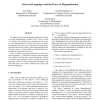Free Online Productivity Tools
i2Speak
i2Symbol
i2OCR
iTex2Img
iWeb2Print
iWeb2Shot
i2Type
iPdf2Split
iPdf2Merge
i2Bopomofo
i2Arabic
i2Style
i2Image
i2PDF
iLatex2Rtf
Sci2ools
COCO
2003
Springer
2003
Springer
Universal Languages and the Power of Diagonalization
We define and study strong diagonalization and compare it to weak diagonalization, implicit in [7]. Kozen’s result in [7] shows that virtually every separation can be recast as weak diagonalization. We show that there are classes of languages which can not be separated by strong diagonalization and provide evidence that strong diagonalization does not relativize. We also define two kinds of indirect diagonalization and study their power. Since we define strong diagonalization in terms of universal languages, we study their complexity. We distinguish and compare weak and strict universal languages. Finally we analyze some apparently weaker variants of universal languages, which we call pseudouniversal languages, and show that under weak closure conditions they easily yield universal languages.
Related Content
| Added | 06 Jul 2010 |
| Updated | 06 Jul 2010 |
| Type | Conference |
| Year | 2003 |
| Where | COCO |
| Authors | Alan Nash, Russell Impagliazzo, Jeffrey B. Remmel |
Comments (0)

